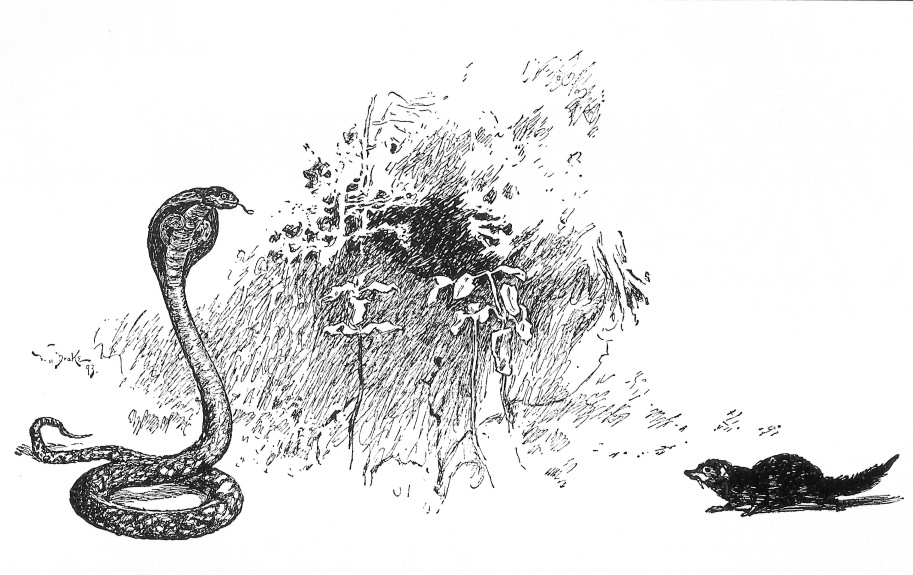Read the previous part here…
The third pundit exclaimed “इष्टं धर्मेण योजयेत् – One should tie a well-wisher to Dharma” and so the fourth grabbed the donkey and tied it to the camel.

In the meantime, someone from the crowd went and narrated this incident to the washerman, whose donkey now stood tied awkwardly to the surprised camel. The washerman came running to the ground, stick in hand, determined to teach the fools a lesson. Unfortunately for him, and fortunately for the fools, they had already left the place before he reached there. The donkey was unceremoniously untied and towed back to the ghats.
The pundits now reached a river. One of the pundits saw a big Palash leaf floating with the current. He recalled a saying that he had read – आगमिष्यति यत्पत्रं तदस्मान्स्तारयिष्यति -whichever leaf comes your way, it will take you across the river. And so he jumped onto the leaf, thinking it will help him cross the river, but instead, he started to sink.
आगमिष्यति यत्पत्रं तदस्मान्स्तारयिष्यति – whatever circumstances you encounter, they will all help you cross the river of life…
The second pundit was quick enough to see him start to get carried away with the strong river currents, and caught his hair, and remembered…
सर्व-नाशे समुत्पन्ने अर्धं त्यजति पण्डितः ।
अर्धेन कुरुते कार्यं सर्व-नाशो हि दुःसहः ॥ ४० ॥
sarva-nāśe samutpanne ardhaṃ tyajati paṇḍitaḥ |
ardhena kurute kāryaṃ sarva-nāśo hi duḥsahaḥ || 40 ||
When total loss is imminent, the wise let go of half of what is being lost, and hold on to make do with the other half. This, is better than losing that thing altogether.
Thinking this, he cut off the head of the drowning pundit.
The remaining three continued on their journey, and soon reached a village. The villagers welcomed them warmly, and three village elders offered to host the pundits in their respective homes.
The first one was served सेंवई – a sweet dish made from vermicelli, sugar and milk. The pundit took a quick look at the serving pot and remembered what he had read in a book – दीर्घसूत्री विनश्यति – the one who eats long threads dies! “And so, if I eat this, I will not remain alive”, he thought to himself. He got up, excused himself, and left the place, hungry, but happy that he had ‘narrowly escaped death.’
The second pundit was offered rotis. He recalled the sloka – “अतिविस्तारविस्तीर्णं तद्भवेन्न चिरायुषं” – That which is spread out wide does not last long. “If I eat this, I will not last long too!”, he thought to himself, and quickly left the place.
The third was offered Vadas – donut-shaped preparations with a hole in the middle. “छिद्रेष्वनर्था बहुलीभवन्ति – anything with an inherent fault will always cause problems”, he remembered. “If I have this faulty preparation, one that has a hole in the middle, I too will fall into many problems. No, I cannot afford that”, thought the third pundit as he too left the house, his hunger un-satiated.
अनागतविधाता च प्रत्युत्पन्नमतिश्च यः ।
द्वावेव सुखमेधते दीर्घसूत्री विनश्यति ।।
anāgatavidhātā ca pratyutpannamatiśca yaḥ | dvaveva sukhamedhete dīrghasūtrī vinaśyati ||
Mahabharata Shanti Parva
Anagatvidhata (one who thinks of the solution before the problem presents itself) and Pratyutpannamati (one who works using his intellect according to the situation) always remain happy and progress well. The one who suffers is Dīrghasūti – a person who is lazy and takes a long time to get anything done.
“अतिविस्तारविस्तीर्णं तद्भवेन्न चिरायुषं” – no task should be stretched for long – one should not take more time than needed to complete a task.
यथैव पुष्पं प्रथमे विकासे समेत्य पातुं मधुपाः पतन्ति ।
एवं मनुष्यस्य विपत्तिकाले छिद्रेष्वनर्था बहुलीभवन्ति ।।
(मृच्छकटिकम्, नवम् अंक, २६) – Mṛcchakatika by Śudraka
Just as a budding flower attracts a lot of bees eager to taste it’s honey, in difficult times, even a slight mistake leads to a lot of problems all at once.
And so the three foolish pundits stayed hungry, were ridiculed by the villagers because of their foolishness, and lost their way once again.
When they finally reached their own city, they were so exhausted that they slept for three long days. Their ‘learnings and knowledge’ had not helped them one bit, on the contrary, it had led to one of them losing his life, and the others losing their self-respect.
“That is why I said”, concluded TruptaKumar – Though well-versed in the sciences, if you have no practical knowledge, you will become the object of ridicule, much like those foolish pundits were ridiculed by everyone, since they had no knowledge of worldly-affairs.
to be continued…
